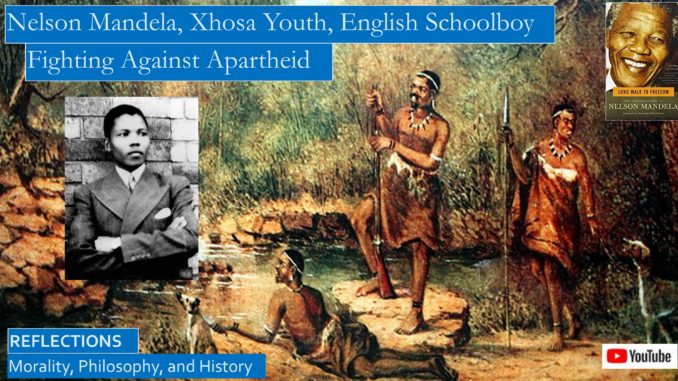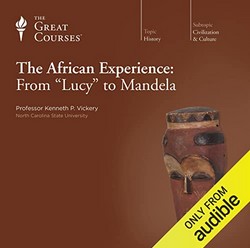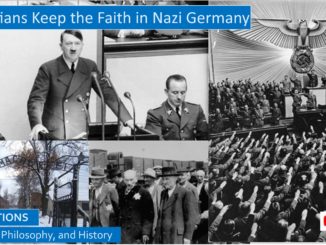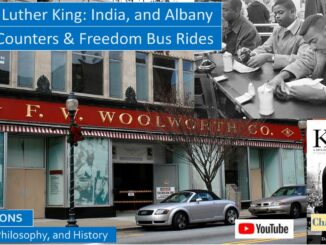
Nelson Mandela rebelled at the end of his schooling, and Nelson, the future advisor to the king, and the future king, named Justice, both absconded to Johannesburg with travel documents the obtained claiming they were on an errand for the regent. Once there, they presented themselves to chief African headman at the offices of Crown Mines, the main industry of Johannesburg.
Blog 1 of this series: http://www.seekingvirtueandwisdom.com/nelson-mandela-blog-1-a-childhood-in-transition/
Please see our YouTube video, with many photos, at: https://youtu.be/7nx81VPqoX8
Nelson tells us, “there is nothing magical about a gold mine. Barren and pock-marked, all dirt and no trees, fenced in all sides, a gold mine resembles a war-torn battlefield. The noise was harsh and never-ending, the rasp of shaft-lifts, the jangling of power drills, the distant rumble of dynamite, the barked orders of the bosses. Everywhere I looked I saw black men in dusty overalls looking bent and tired. They lived on the grounds in bleak, single-sex barracks that contained hundreds of concrete bunks inches from each other.
Gold-mining here was costly because the ore was low grade and deep under the earth. Only the cheap labor of thousands of Africans working long hours for little pay with no rights made gold-mining profitable for the white-owned companies that became wealthy beyond the dreams of Croesus on the backs of the African people.”
Mandela was incredibly fortunate in both his timing of the trip and the breaks he got because of his bloodline. He never had to spend the hours of daylight in the deep, dark bowels of the earth digging for rocks laced with specks of gold. Mandela eventually was able to rent a room from a prosperous African landowner, prosperous only in comparison to other Africans, for the room was “no more than a shack, with a dirt floor, no heat, no electricity, no running water. But it was a place of my own and I was happy to have it.” He needed little closet space, he had only one suit.
Mandela was incredibly fortunate to find a liberal Jewish law firm who would allow a young talented African to work as a clerk so he become an attorney. Europe at the time was slogging through World War II. The door leading to a legal profession was cracked open, and Mandela was able to push his way through. He tells us, “the firm of Witkin, Sidelsky and Eidelman was one of the largest law firms in the city and handled business from both blacks and whites. In addition to studying law and passing certain exams, to qualify as an attorney in South Africa you had to spend several years as an apprentice to practicing lawyer, which is known as serving articles.” To do this, Mandela had to finish his BA taking correspondence courses with the University of South Africa. Eventually he became a lawyer and started his own law firm.
Life was hard even with all the advantages Mandela enjoyed that the average African would have envied. The salary the law firm paid him was so paltry he barely pay for the bus and food and candles, there were days he ate very little and there were days he walked the long walk to work to save on bus fare.
One of his bosses, Mr. Sidelsky, warned him, “if you get into politics, your practice will suffer. You will get into trouble with the authorities. You will lose all your clients, you will go bankrupt, you will break up your family, and you will end up in jail.”
This was a prophetic warning. Politics did get him into trouble, politics would land him in jail, politics robbed his family of their time together. Divorce was forced upon him in his first marriage, after the stress of constant police surveillance his first wife became a Jehovah’s Witness, who disavow all politics to evangelize for the kingdom. He met his second wife, Winnie Mandela, in the movement, but during this marriage the authorities forbade him to meet with more than a few people at a time, which meant he could not even attend his kids’ birthday parties. Their marriage would end tragically in divorce many decades later after he was released from prison. The years Nelson should have spent with his wife and children were instead years he had to spend in prison, and were also years his wife and children endured constant harassment by the South African version of the Gestapo.
Mandela became active in the ANC, the African National Congress. He helped found the Youth Council, a younger and more radical branch of the ANC. He was part of a group that did not favor permitting whites to join the ANC, and since the Communist Party leaders were mostly white, the ANC kept the communists at a distance, although many were members of both. The ANC supported a miner’s strike for higher wages and better working conditions that was brutally suppressed by the government.
There was discrimination against Africans and the colored, or people who were part black, and the Indians. When Gandhi was living in South Africa before WWII he had won a measure of freedom for the Indians. Africans could not vote, they owned little of their land, and they were paid poverty level wages.
Life for the Africans became much worse in 1948 when the Boer Nationalist Party unexpectedly won the national elections. The Nationalist Party leaders had publicly sympathized with Nazi Germany. “The Nationalists were led by Dr. Daniel Malan, a former minister of the Dutch Reformed Church and a newspaper editor. Theirs was a party animated by bitterness toward the English, who had treated them as inferiors for decades, and by bitterness toward the African, whom the Nationalists believed was threatening the prosperity and purity of Afrikaner culture.”
“Malan’s platform was known as apartheid. . . The often haphazard segregation of the past three hundred years would be consolidated into a monolithic system diabolical in its detail, inescapable in its reach, and overwhelming in its power.” Their motto was “the white man must always remain boss.” “Apartheid was giving moral underpinnings by the Dutch Reform Church, which suggested that Afrikaners were God’s chosen people and the blacks were a subservient species. In the Afrikaner’s worldview, apartheid and the church went hand in hand.”
Was South Africa like Jim Crow Mississippi in your worst nightmare? There were both similarities and differences between South Africa and the Deep South. The South Africans were never enslaved, although they were paid starvation wages in the mines and as servants. South Africans always kept their tribal identity, culture, and languages, whereas the children of the slaves in America had little notion of their tribal identity. Under both Jim Crow and apartheid interracial marriage was considered both illegal and immoral, and segregation was enforced by law. Apartheid South Africa spent per capita six times more on white education that it did on black education, similar to the disparity in the separate but equal education in the Jim Crow Deep South. One important difference was that South African blacks could be denied the right to assemble, whereas this was never totally lost in the Jim Crow Deep South.
As the apartheid legislation constricted the rights and liberties of the black Africans more and more, the ANC called for more boycotts, strikes, civil disobedience, and noncooperation, taking inspiration from Gandhi’s protests a generation earlier. The ANC organized a Freedom Day strike where two thirds of blacks in South Africa stayed home from work one day. The government banned meetings for that day, and one meeting that did occur was dispersed with gunfire. Eighteen Africans died and many were wounded.
Several weeks later the Suppression of Communism Act was enacted, making illegal for any party to promote “political, industrial, social or economic change within the Union by the promotion of disturbance or disorder.” Protests were now illegal. Then the Groups Area Act was passed, which segregated races by area. “If whites wanted the land or houses of other groups, they could simply declare the land a white area and take them,” removing the Africans to their own designated not as nice areas. “The Nationalist government was making any legal expression of dissent or protest impossible.”
Mandela was a reluctant revolutionary. He recalls his thoughts at the time, “I began to suspect that both legal and extra-constitutional protests would soon be impossible. In India, Gandhi had been dealing with a foreign power that was more realistic and farsighted, unlike the Afrikaners in South Africa. Non-violent passive resistance is effective as long as your opposition adheres to the same rules as you do. But if peaceful protest is met with violence, its efficacy is at an end. For me, nonviolence was not a moral principal but a strategy; there is no moral in using an ineffective weapon.”
This reminds me of the story about a lunch break during the Munich negotiations. Prime Minister Chamberlain was complaining about Gandhi to Hitler. Hitler’s response, why don’t you just shoot him? That would be a final solution.
Apartheid helped feed cases to his law practice as many Africans suffered from the real legal consequences of discrimination and persecution, while at the same time apartheid robbed Africans of property and the means to fund a legal defense against the injustices they suffered. Long after Mandela was thrown in prison Winnie would try to collect on some of these debts from his law practice so she could simply survive.
The ANC was anticipating that the government would declare that it would be an illegal organization just as it had declared that membership in the Communist Party was illegal. There was more restrictive apartheid legislation, there were more protests. A Congress of People was organized, three thousand delegates braved police intimidation to attend, a Freedom Charter was drafted which was similar to the American Declaration of Independence and the French Rights of Man, requesting equal rights, equal dignity, equal opportunity, and equal voting rights for all races
The government did not like the Freedom Charter. An entire chapter in the autobiography titled TREASON tells us the dramatic story of how the government arrested Mandela and the other leaders of the ANC on the charge of treason. They were imprisoned for over a year while the pre-trial preparation and the trial itself wound itself out. Remarkably, the South African court found them innocent of the main charge of the indictment, that the ANC was a communist organization seeking the violent overthrow of the apartheid regime.
Nelson writes in the last paragraph in the TREASON chapter, “the consequence of the government’s humiliating defeat was that the state decided never to let it happen again. From that day forth they would not rely on judges whom they had not themselves appointed. They were not going to observe what they considered the legal niceties that protected terrorists or permitted convicted prisoners certain rights in jail. During the Treason Trial no prisoners were isolated, beaten, or tortured to elicit information. All of those things became commonplace shortly thereafter.”
After he was released Mandela went underground. He traveled around the country attending clandestine ANC meetings to plan resistance. The ANC decided to form a military wing called Umkhonto we Sizwe, MK for short, in English, the Spear of the Nation. Mandela was placed in charge of the MK. The MK was not very well armed, nor did it have many soldiers, but Mandela knew perfectly well how to read books about armed struggles. If you can’t shoot the enemy, you can darn sure throw a book at him, I suppose.
The ANC and MK discussed their options. Open revolution was impractical. Terrorism was nixed, they didn’t “want to start a blood feud between white and black.” Guerrilla warfare was a possibility, but it was too violent, and you needed guerrillas.
Dr Wikipedia notes that Mandela also was a member of the Communist Party at this time, some suggesting that he even rose to a leadership position. This makes historical sense, since he would be soliciting funds for weapons
Sabotage was a much better starting option. You could blow up military installations, power plants, telephone stations, and transportation links when nobody was around. The government would be alarmed and embarrassed, nobody would be killed, maybe foreign investors would get jittery, maybe that would force the government to the bargaining table. They actually did blow up some power stations and government offices when nobody was there, taking the government by surprise, and surprising both white and black citizens.
They needed weapons. Mandela took a trip out of the country to gain support and some arms, he had some successes, he visited Tanganyika, Ethiopia, Egypt, Morocco, Algeria, and some other places, and got to fly over Victoria Falls.
But Big Brother had been watching him. Soon after he returned to South Africa he was picked up by the police. Mandela was tried and sentenced to five years in prison for inciting strikes and travelling outside the country without a passport.[1]
Blog 3 of this series: http://www.seekingvirtueandwisdom.com/mandela-decades-spent-in-prison/
[1] Nelson Mandela, “Long Walk To Freedom, an Autobiography,” (New York: Little Brown and Company, 1994), pp. 63-307.






4 Trackbacks / Pingbacks